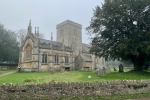July 2015
Vision and Planning
Why Strategic Planning?
This article is also available in Spanish here. Este artículo está disponible en español aquí.
I receive some pretty interesting responses when I tell people that I facilitate strategic planning for congregations. By far the most frequent response is a blank stare followed by a polite, “Oh, that must be interesting.” Sometimes an enthusiastic affirmation about the value of strategic planning is offered. Less frequently, fortunately, are those who stare as if they suddenly imagine horns growing out of my head as they question applying corporate gobbledygook to a community of faith.
A simple definition of strategic planning is setting priorities to enable a desired outcome to be achieved. It’s about setting a goal and making decisions and taking actions to achieve it. The goal is our vision, and the actions are our strategies.
Vision provides direction. This is valuable for congregations because members are each traveling their own diverse faith journeys. Out of our individuality, God calls us into community to seek God and to bring others to God’s Kingdom. The church community to which we are called is special because God has uniquely assembled its members and many other gifts to use to seek and evangelize.
In congregations, members can run off in scattered directions, or remain complacent in our pews just having our own needs satisfied. Vision calls us to follow a particular path, together. Without vision, “the people are unrestrained.” (I love that translation of Proverbs 29:18 in the New American Standard Bible). Unrestrained might sound fun, but the point is to be obedient in following God’s direction so that God’s will is accomplished.
Discerning God’s call as a community means engaging as many members as possible in intentional, prayerful reflection on the gifts God has uniquely provided your congregation and the needs that exist in the world around you.
Such an intentional journey can be led and organized internally. Sometimes church leaders prefer an outside facilitator skilled in listening and guiding. The Episcopal Church Foundation has begun a new initiative, Strategic Solutions, to walk alongside congregations as they discern both vision and strategies for realizing this vision. ECF customizes the process to fit the unique culture and conditions of each congregation, diocese, school, camp, or organization.
Whether you use an outside facilitator or coordinate your congregation’s journey internally, the important thing is to be intentional about understanding your congregation’s ministry potential. Lay and clergy leadership should be committed to participate in the process. Later, they must also commit to use the vision as a tool for strategic decision-making.
Congregational strategic planning heightens a sense of shared identity and purpose. May your vision be focused and your strategies be blessed!
Try This: Identifying the ministry strengths of your congregation is an important part of the strategic thinking process and one that should involve broad participation. Schedule some small group discussions and invite members of the congregation to share a church related experience that is special to them. Questions that invite stories include:
- Tell me about a time when you experienced a sense of community at St. John’s.
- Tell me about a time when St. Anne’s was at its best in representing Christ. What made that possible?
- An apostle means someone who is sent forth. What about your experience at Trinity Church has prepared you to be an apostle in the world today?
Questions can be asked and answered in a variety of settings, including a facilitated discussion where people are invited to share their answers at their own tables, and then report their stories to the entire gathering. Or you can post questions on flip chart paper and invite people to write their answers over a period of a few weeks. It is important to record answers so the vestry can then review them and identify trends in the answers that reveal your congregation’s ministry strengths.
Linda Buskirk is a capital campaign and strategic solutions consultant for the Episcopal Church Foundation. She brings to ECF diverse experience as a consultant to social-profit agencies, specializing in board governance and strategic development. Linda has a masters degree in public affairs from Indiana University. She lives in Fort Wayne, Indiana, where she and husband Ron are members of Trinity Episcopal Church. She is a graduate of the Congregational Development Institute of the Diocese of Northern Indiana. Linda serves her parish and diocese in many capacities, including roles in stewardship and communications ministries.
Resources
- Holy Shift: Strategic Thinking for Congregations, an ECF webinar
- Strategic Thinking: How our biases impact our parish’s decisions by Erin Weber-Johnson, ECF Vital Practices, May 21, 2015
- The Difference Between Mission and Vision by Linda Buskirk, ECF Vital Practices, January 13, 2012
- Vision for Impact, Not Just Change, by Linda Buskirk, ECF Vital Practices’ Vestry Papers, July 2014
- Vision and Planning, an ECF webinar
Don't miss an issue of Vestry Papers! Sign up for your free subscription here.






